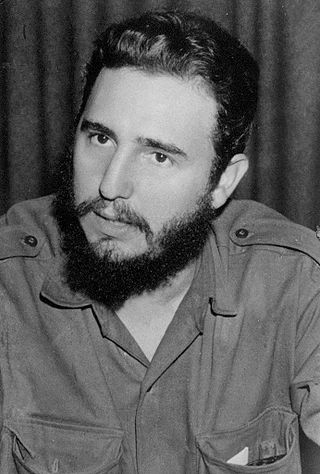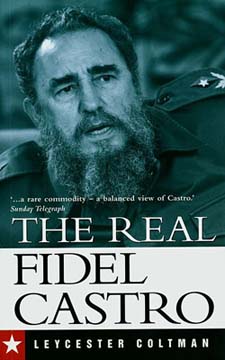The island of Cuba was inhabited by various Amerindian cultures prior to the arrival of the explorer Christopher Columbus in 1492. After his arrival, Spain conquered Cuba and appointed Spanish governors to rule in Havana. The administrators in Cuba were subject to the Viceroy of New Spain and the local authorities in Hispaniola. In 1762–63, Havana was briefly occupied by Britain, before being returned to Spain in exchange for Florida. A series of rebellions between 1868 and 1898, led by General Máximo Gómez, failed to end Spanish rule and claimed the lives of 49,000 Cuban guerrillas and 126,000 Spanish soldiers. However, the Spanish–American War resulted in a Spanish withdrawal from the island in 1898, and following three-and-a-half years of subsequent US military rule, Cuba gained formal independence in 1902.

Fidel Alejandro Castro Ruz was a Cuban revolutionary and politician who was the leader of Cuba from 1959 to 2008, serving as the prime minister of Cuba from 1959 to 1976 and president from 1976 to 2008. Ideologically a Marxist–Leninist and Cuban nationalist, he also served as the first secretary of the Communist Party of Cuba from 1965 until 2011. Under his administration, Cuba became a one-party communist state; industry and business were nationalized, and socialist reforms were implemented throughout society.

François Duvalier, also known as Papa Doc, was a Haitian politician who served as the president of Haiti from 1957 until his death in 1971. He was elected president in the 1957 general election on a populist and black nationalist platform. After thwarting a military coup d'état in 1958, his regime rapidly became more autocratic and despotic. An undercover government death squad, the Tonton Macoute, indiscriminately tortured or killed Duvalier's opponents; the Tonton Macoute was thought to be so pervasive that Haitians became highly fearful of expressing any form of dissent, even in private. Duvalier further sought to solidify his rule by incorporating elements of Haitian mythology into a personality cult.

Isla de la Juventud is the second-largest Cuban island and the seventh-largest island in the West Indies. The island was called the Isle of Pines until 1978. It has an area 2,200 km2 (850 sq mi) and is 50 km (31 mi) south of the island of Cuba, across the Gulf of Batabanó. The island lies almost directly south of Havana and Pinar del Río and is a Special Municipality, not part of any province and is therefore administered directly by the central government of Cuba. The island has only one municipality, also named Isla de la Juventud.

Che is an interjection commonly used in Argentina, Uruguay, Bolivia, Paraguay, Rio Grande do Sul (Brazil) and Valencia (Spain), signifying "hey!", "fellow", "guy". Che is mainly used as a vocative to call someone's attention , but it is often used as filler too. The Argentine revolutionary Ernesto "Che" Guevara earned his nickname from his frequent use of the expression, which amused his Cuban comrades.

The Catholic Church in Cuba is part of the worldwide Catholic Church, under the spiritual leadership of the Pope in Rome. Catholics make up approximately half of the population of Cuba.

After the establishment of diplomatic ties with the Soviet Union after the Cuban Revolution of 1959, Cuba became increasingly dependent on Soviet markets and military aid and was an ally of the Soviet Union during the Cold War. In 1972 Cuba joined the Council for Mutual Economic Assistance (Comecon), an economic organization of states designed to create co-operation among the communist planned economies, which was dominated by its largest economy, the Soviet Union. Moscow kept in regular contact with Havana and shared varying close relations until the end of the Soviet Union in 1991. Cuba then entered an era of serious economic hardship, the Special Period.

Vilma Lucila Espín Guillois was a Cuban revolutionary, feminist, and chemical engineer. She helped supply and organize the 26th of July Movement as an underground spy, and took an active role in many branches of the Cuban government from the conclusion of the revolution to her death. Espín helped found the Federation of Cuban Women and promoted equal rights for Cuban women in all spheres of life.
Arthur Gardner (1889–1967) was a United States foreign diplomat and American ambassador to Cuba 1953-1957. Gardner was a close confidant of President Dwight D. Eisenhower and was also strongly pro-Batista.

Alex von Tunzelmann is a British historian, screenwriter and author.
The Dominican Party was the de facto only permitted political party in the Dominican Republic during the dictatorship of Rafael Trujillo, who ruled the country from 1930 to 1961. Its symbol was a palm tree.
Christopher Columbus, on his first Spanish-sponsored voyage to the Americas in 1492, sailed south from what is now the Bahamas to explore the northeast coast of Cuba and the northern coast of Hispaniola. Columbus, who was searching for a route to India, believed Cuba to be a peninsula of the Asian mainland. The first sighting of a Spanish ship approaching Cuba was on 28 October 1492, probably at Bariay, Holguín Province, on the eastern point of Cuba.
Red heat is a practice of using colours to determine the temperature of metal

The Real Fidel Castro is a biography of the Cuban revolutionary and politician Fidel Castro, written by the British diplomat Sir Leycester Coltman (1938–2003) and first published by Yale University Press in 2003. A diplomat for the government of the United Kingdom, Coltman had been appointed to the position of British ambassador to Cuba from 1991 through to 1994, during which time he got to know Castro personally. He died shortly before his biography's publication.

Fidel Castro proclaimed himself to be "a socialist, and Marxist–Leninist". As a Marxist–Leninist, Castro believed strongly in converting Cuba, and the wider world, from a capitalist system in which individuals own the means of production into a socialist system in which the means of production are owned by the workers. In the former, there is a class divide between the wealthy classes who control the means of production and the poorer working classes who labor on them, whilst in the latter, there is a decreasing class divide as the government redistributes the means of production leading to communism. Castro used Leninist thought as a model upon which to convert the Cuban state and society into a socialist form.
Fort Dimanche is a former prison in Haiti located near La Saline in Port-au-Prince that was notorious for torture and murder during the reign of François Duvalier. It was declared a monument in 1987.

The Communist Party of Cuba is the sole ruling party of Cuba. It was founded on 3 October 1965 as the successor to the United Party of the Cuban Socialist Revolution, which was in turn made up of the 26th of July Movement and Popular Socialist Party that seized power in Cuba after the 1959 Cuban Revolution. The party governs Cuba as an authoritarian one-party state where dissidence and political opposition are prohibited and repressed. The Cuban constitution ascribes the role of the party to be the "leading force of society and of the state".
The early life of Cuban dictator and politician Fidel Castro spans the first 26 years of his life, from 1926 to 1952. Born in Birán, Oriente Province, Castro was the illegitimate son of Ángel Castro y Argiz, a wealthy farmer and landowner, and his mistress Lina Ruz González. First educated by a tutor in Santiago de Cuba, Fidel Castro then attended two boarding schools before being sent to El Colegio de Belén, a school run by Jesuits in Havana. In 1945 he began studying law at the University of Havana, where he first became politically conscious, becoming a staunch anti-imperialist and critic of United States involvement in the Caribbean. Involved in student politics, he was affiliated to Eduardo Chibás and his Partido Ortodoxo, achieving publicity as a vocal critic of the pro-U.S. administration of President Ramón Grau and his Partido Auténtico.
The political career of Fidel Castro saw Cuba undergo significant economic, political, and social changes. In the Cuban Revolution, Fidel Castro and an associated group of revolutionaries toppled the ruling government of Fulgencio Batista, forcing Batista out of power on 1 January 1959. Castro, who had already been an important figure in Cuban society, went on to serve as Prime Minister from 1959 to 1976. He was also the First Secretary of the Communist Party of Cuba, the most senior position in the communist state, from 1961 to 2011. In 1976, Castro officially became President of the Council of State and President of the Council of Ministers. He retained the title until 2008, when the presidency was transferred to his brother, Raúl Castro. Fidel Castro remained the first secretary of the Communist Party until 2011.
Professor Jean-Joseph Lorimer Denis (1904-1957), known commonly as just Lorimer Denis, was a Haitian Indigenist ethnologist and theorist of the noirist movement. He was an associate of Haitian leader François Duvalier, with whom he founded noirism and published the Les Griots journal with from 1938 to 1940.











